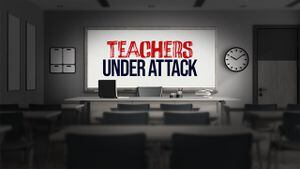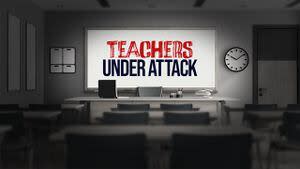
By the time Stephanie Hartung returned to her suburban Seattle classroom this school year, the gash on her head, black eye, and bruising all over her body had healed. But she doesn’t know if the anxiety and stress from her attack – at the hands of a 12-year-old – ever will.
“It feels like it’s really woven into every aspect of my life now, which is tough,” Hartung said. “It’s not fair and it’s just hard. I wouldn’t wish this on any other teacher.”
It’s been more than a year since Hartung was dragged into the hallway and beaten by a sixth grader who had joined her class earlier that day. The student had disrupted a lesson by voicing suicidal iterations. Hartung called for an administrator who arrived, spoke with the child, and sent her back into the classroom. Within moments, Hartung says the student lifted a chair into the air like she was going to throw it at a classmate.
The teacher still gets emotional talking about what happened when she tried to usher the troubled student back into the hallway. The violent attack was captured on school surveillance video.
“It’s something that I think about every day when I walk into school and walk past the hallway where it happened,” she told KIRO-TV. “It felt like it wasn’t me… this kind of thing doesn’t happen at my school.”
But an investigation by eight local television stations, working together in seven states, found thousands of teachers across the country have had similar experiences. Nearly 8,300 teachers in 34 states participated in a voluntary survey asking about violent encounters with students, their opinions about possible causes, and possible solutions.
-
71% of the teachers surveyed said they’d experienced physical violence by a student at least once.
-
4,444 teachers said it happened “more than once” or “many times.”
-
60% of the teachers said they feel afraid to go to school at least sometimes.
-
669 of those teachers said they feel afraid “most days” or “every day.”
“If some of us aren’t willing to speak up about what’s actually going on in the school, nothing’s going to change,” said Cliff Canavan, a teacher in Brockton, Massachusetts.
Canavan has been teaching for 22 years and also coaches athletics at the same high school he attended. He suffered two broken bones in his wrist while breaking up a fight in 2022.
“There’s one of my athletes on the ground, sitting on her butt, unconscious, just getting kicked in the head repeatedly,” recalled Canavan in an interview with WFXT-TV.
He said he grabbed the attacker’s arms to hold her back and was trying to escort her from the area when another girl jumped on them, knocking them into a metal rack. He said students posted video of the violence to social media within minutes.
“They rule the roost. They get to do whatever they want,” said Canavan. “We have students that will have 250, 300 write-ups in a school year, failing all the classes and disrupting the student learning from those that were there that care – and it’s a real problem.”
Canavan said he needed surgery for his injuries and is still dealing with the pain. He said he has several colleagues, with decades of teaching experience, on medical leave with injuries from violent student encounters.
“This is what we’re seeing now is the culmination of a decade of not holding kids who do the wrong thing accountable. They’re not learning consequences for their actions,” said Canavan. “Something’s got to give.”
When asked what they think would help improve teacher safety the most:
-
52% of the teachers surveyed chose “zero-tolerance policies” over options like more supportive administrators, additional police officers, or counselors.
“I think these are really difficult situations,” said Dr. Susan Dvorak McMahon, a DePaul University psychology professor who has studied violence against teachers.
“If you look at what happens when you kick a kid out, then they’re not getting any education,” she said. “Is their pathway just going to become worse?”
McMahon led an American Psychological Association task force that published a report on violence against educators and other school personnel after conducting a survey in 2020 and 2021. She’s since done additional surveying and plans to release an updated report in the coming weeks.
“The research has been a little bit behind in terms of looking at teacher experiences and perspectives. It focused on students for a very long time,” said McMahon. “I think when you’re asking about violence against teachers, you definitely need to ask teachers.”
She pointed out, as with any voluntary survey, that teachers who have experienced violence and aggression might be more inclined to participate in a survey on the topic. But after reviewing the data obtained by the reporters, she said it generally tracked with her findings. She’s particularly concerned about the impact the rise in violence is having on the profession.
-
63% of those surveyed said they’ve considered quitting or retiring because of violence against teachers.
-
84% said students are less likely to respect teachers’ authority since the pandemic.
-
Nearly 5,000 teachers also said it’s harder to connect with students now.
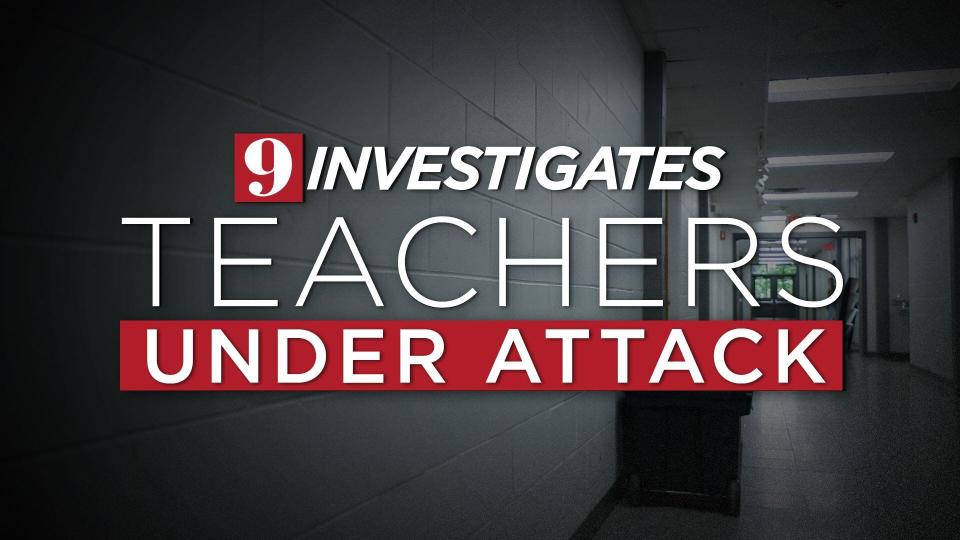

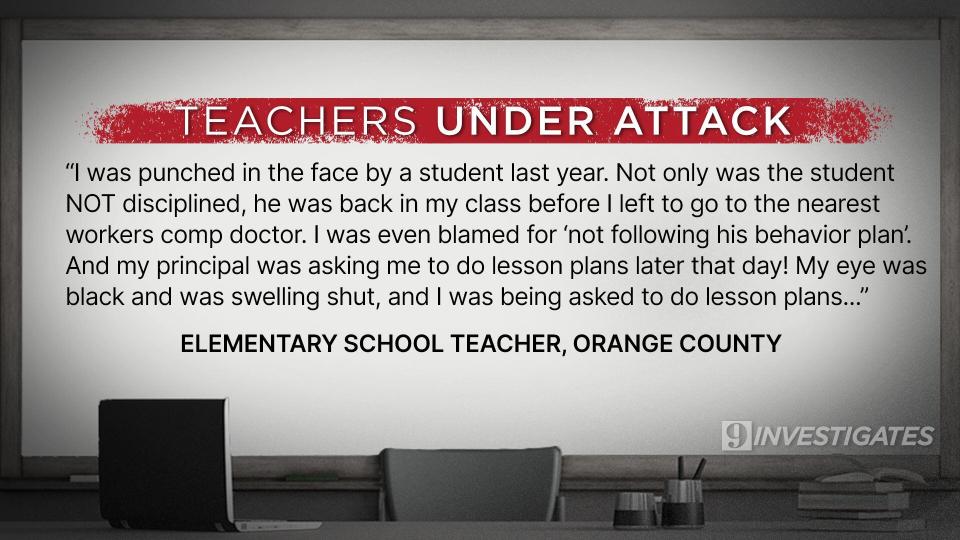

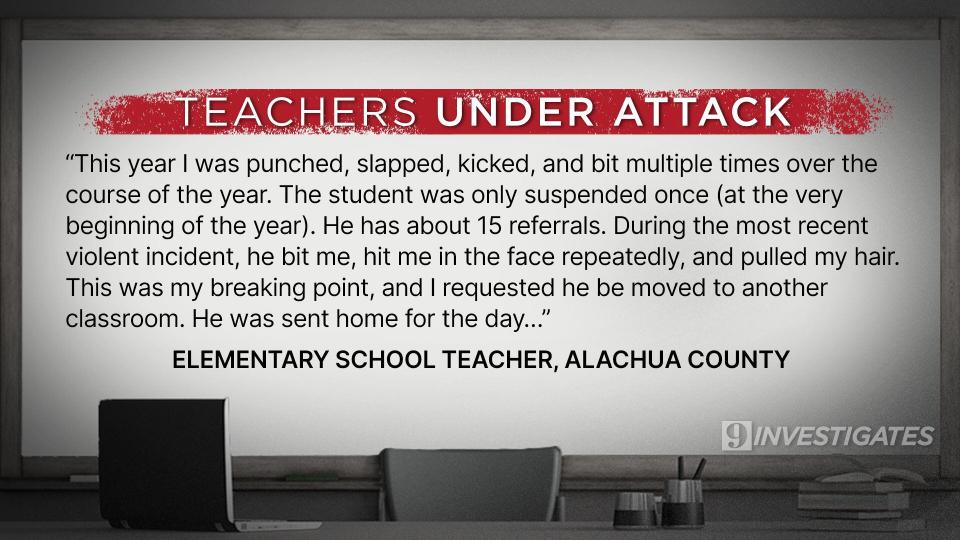

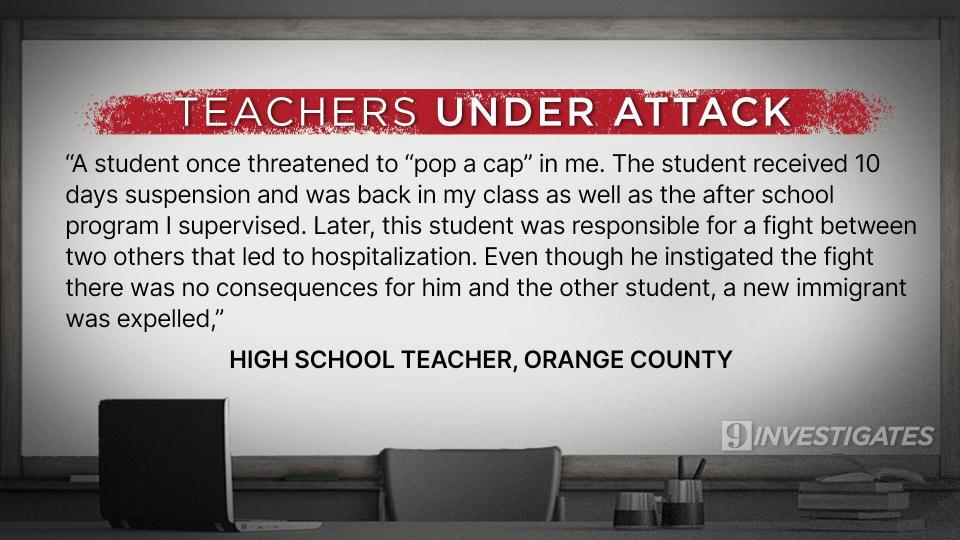

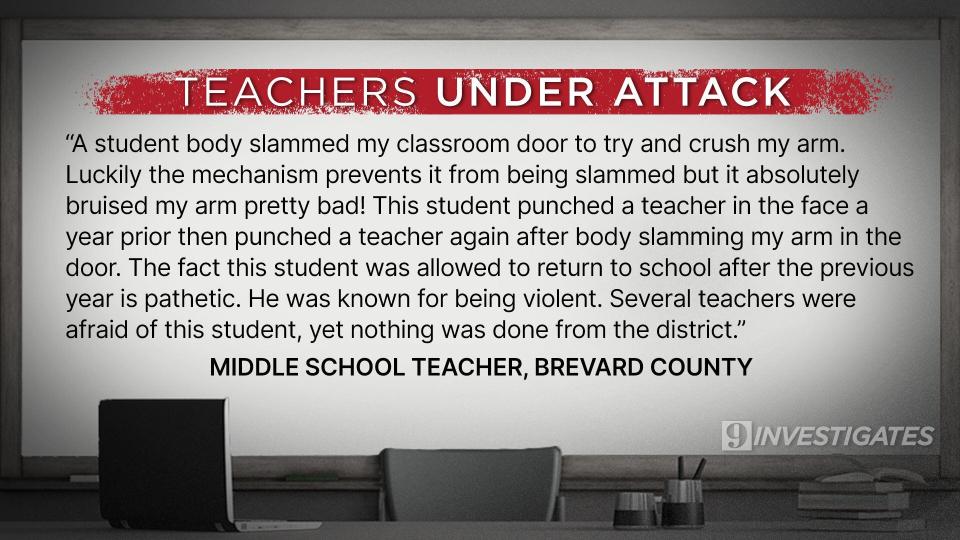

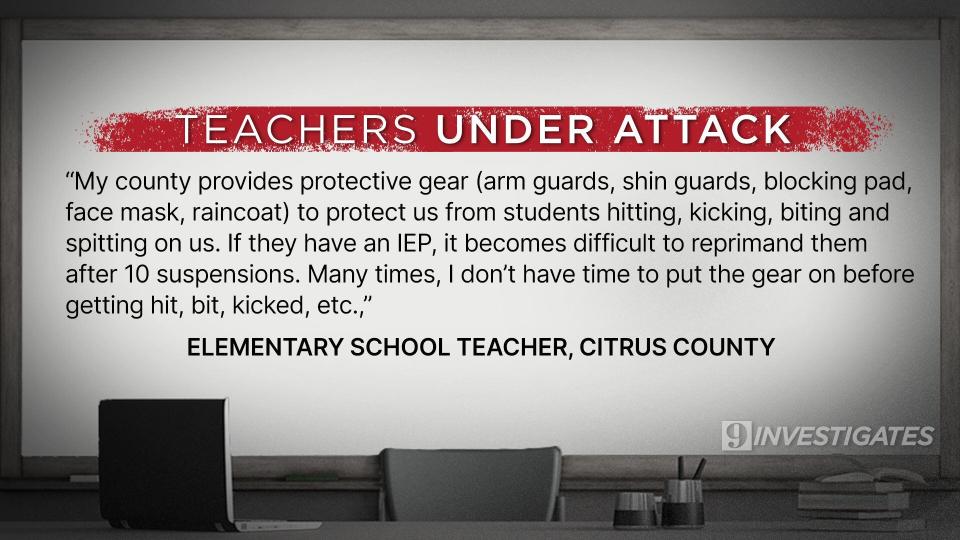

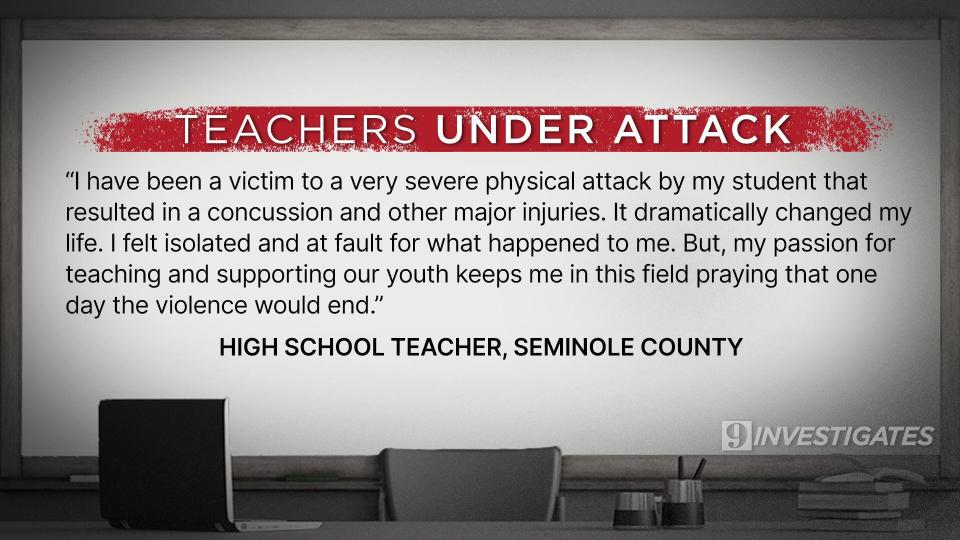

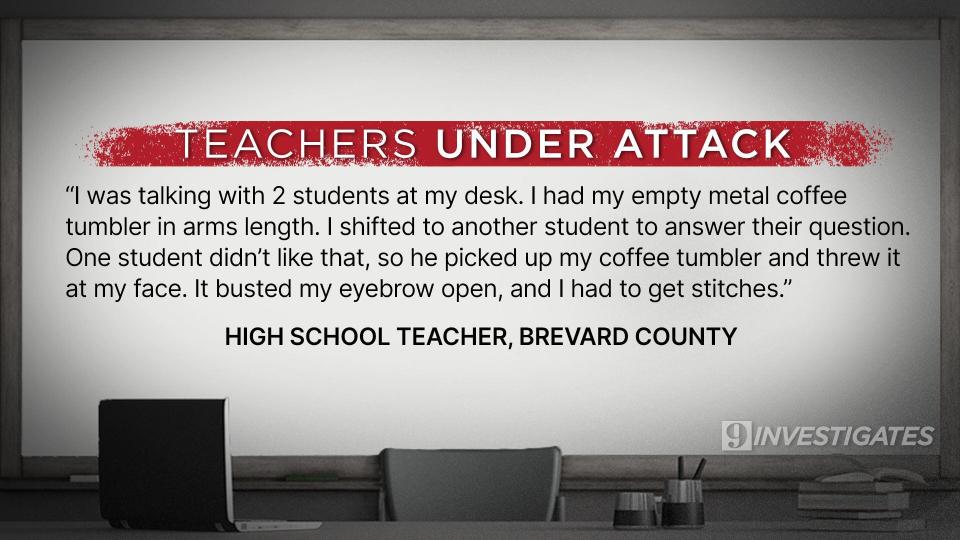

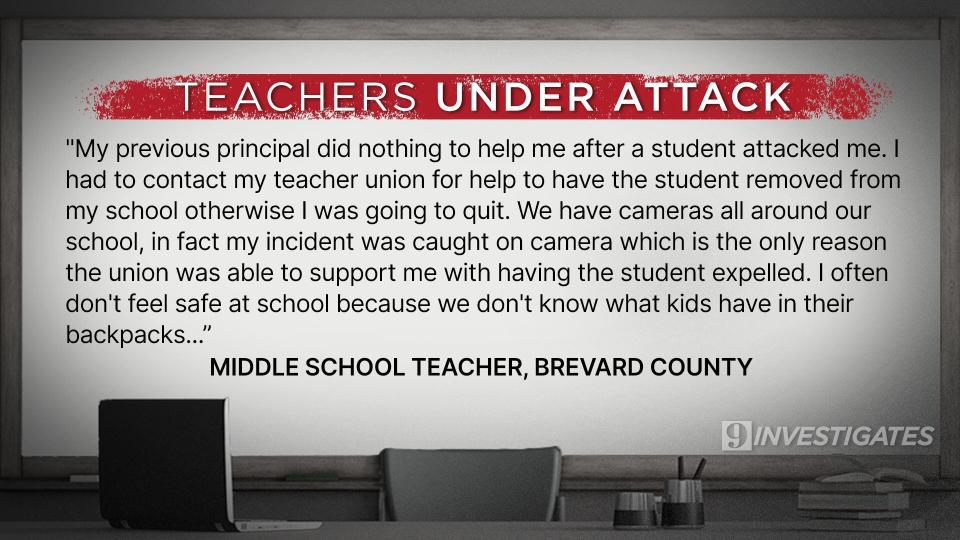

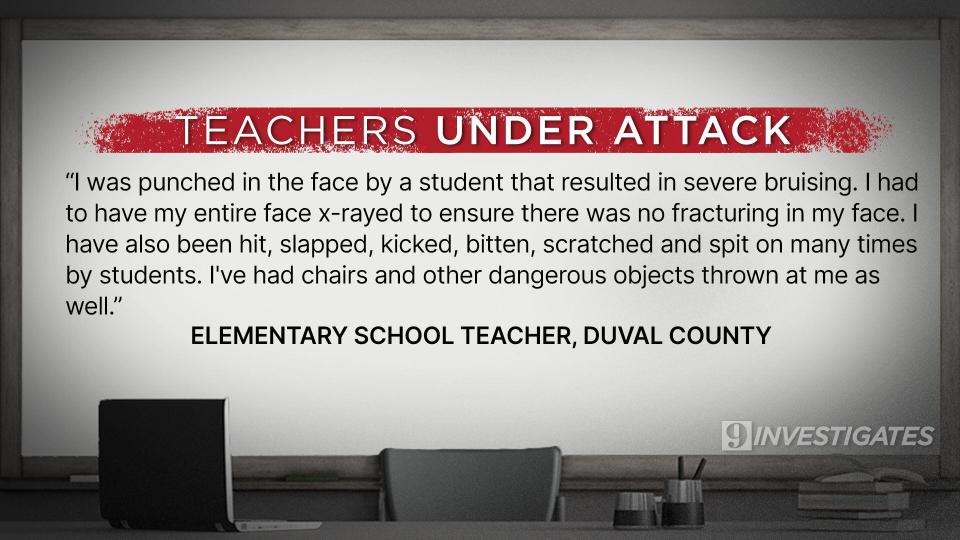

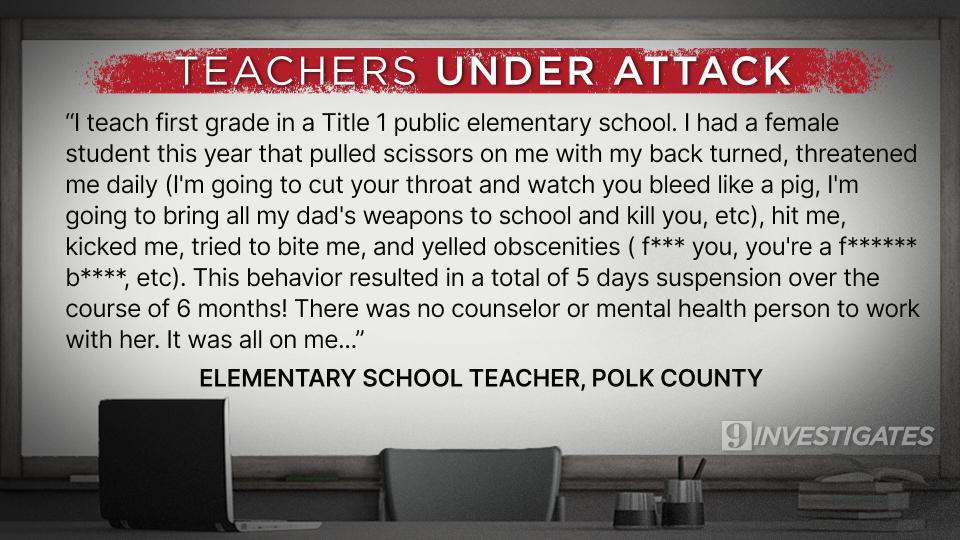

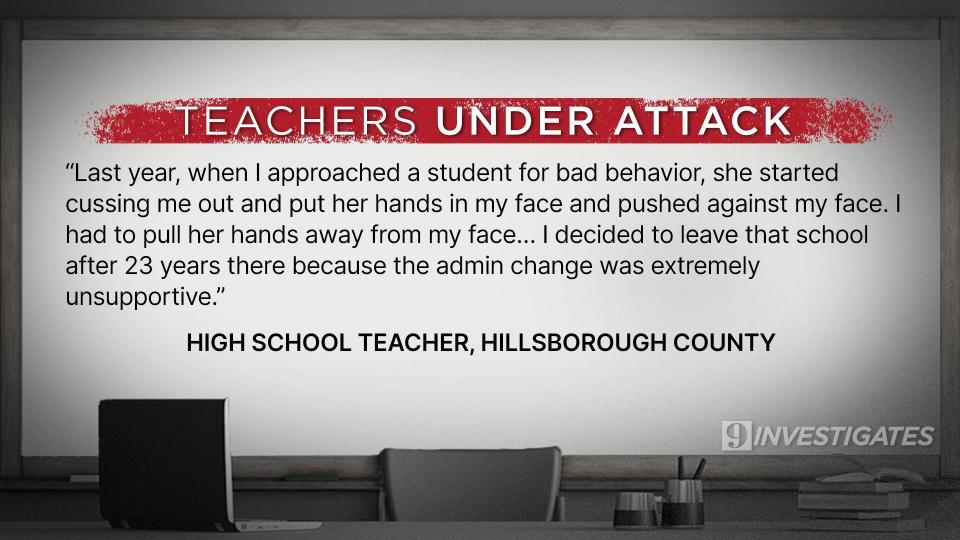

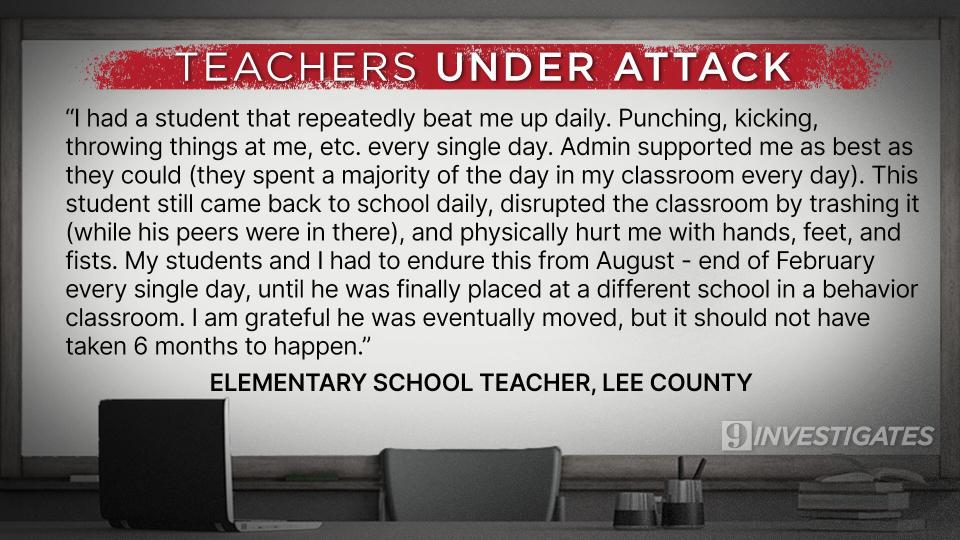

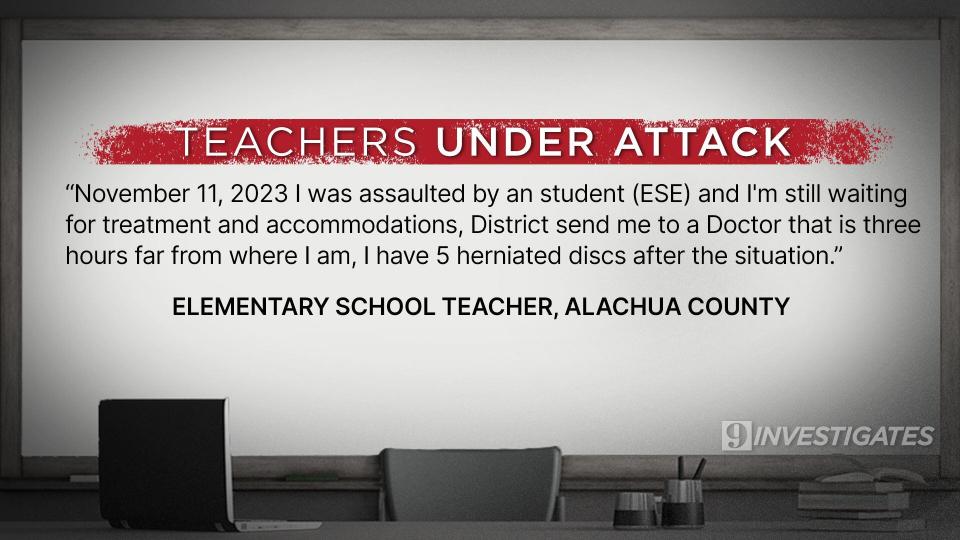

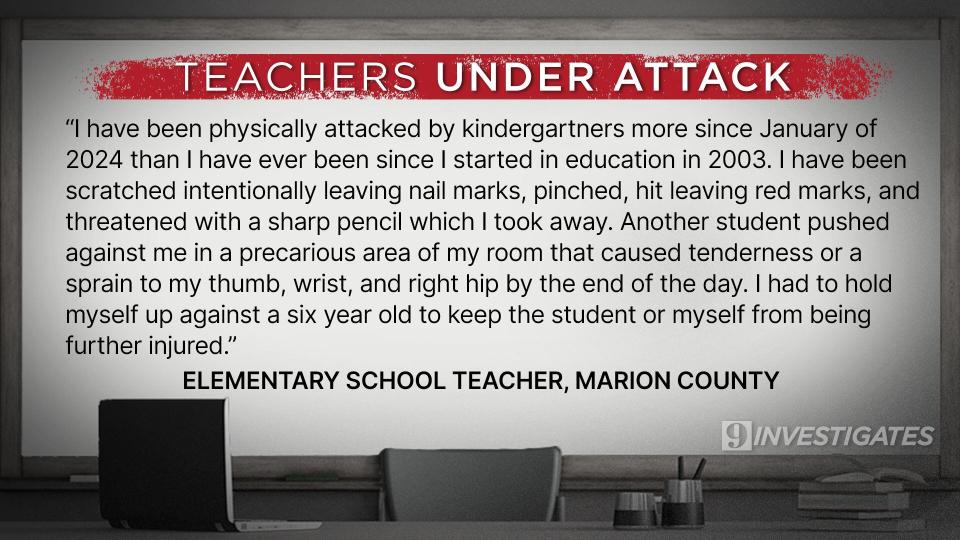

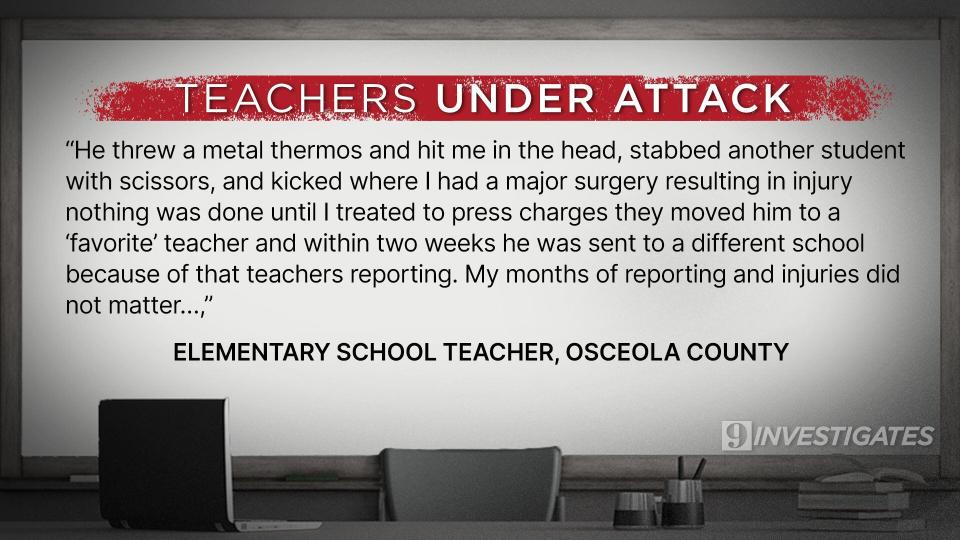

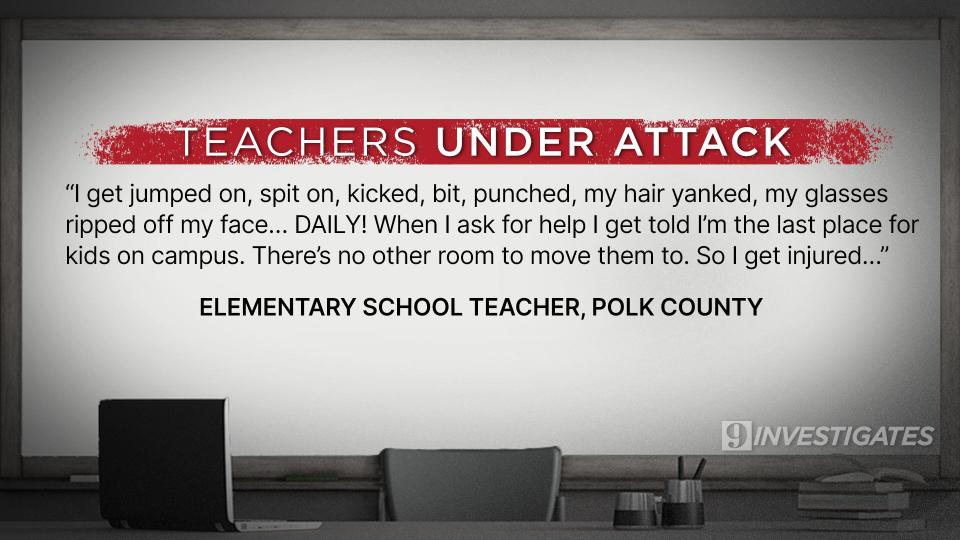

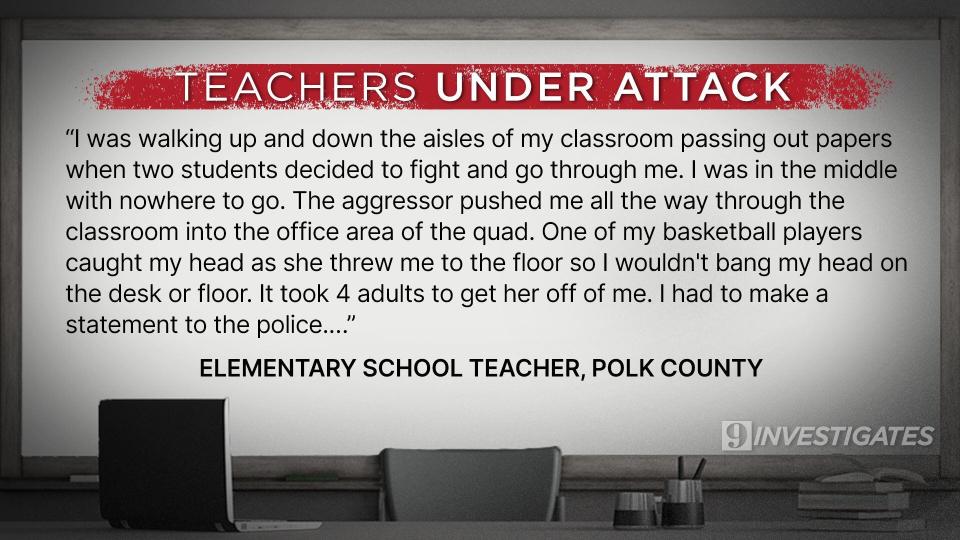

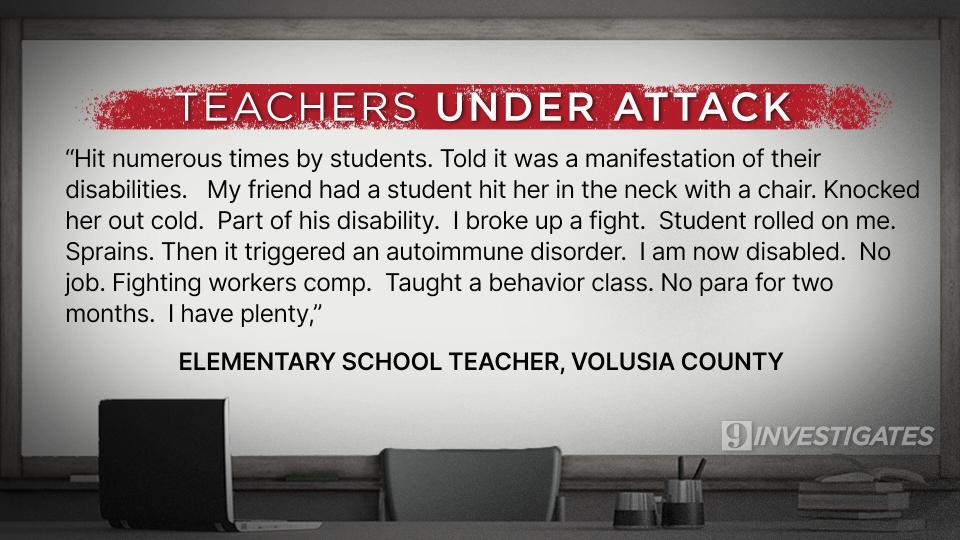

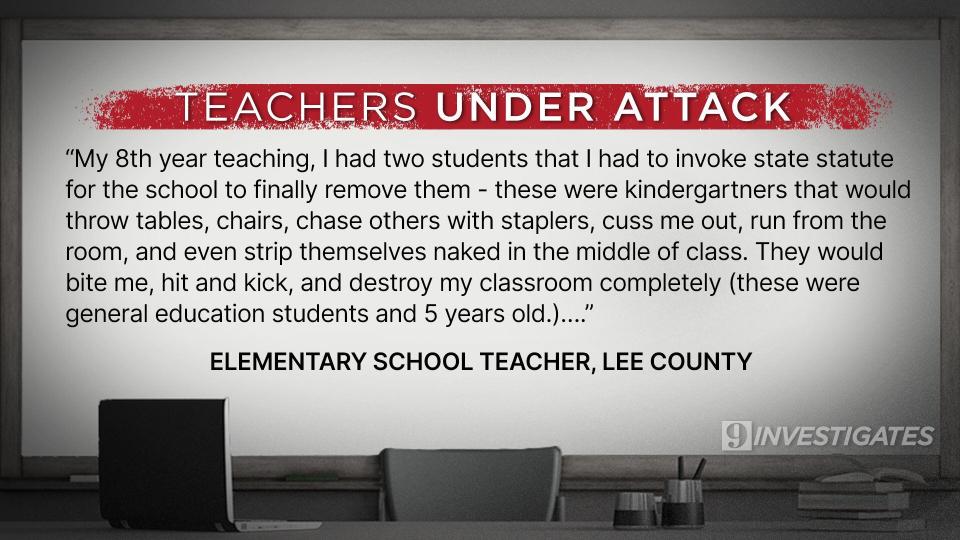

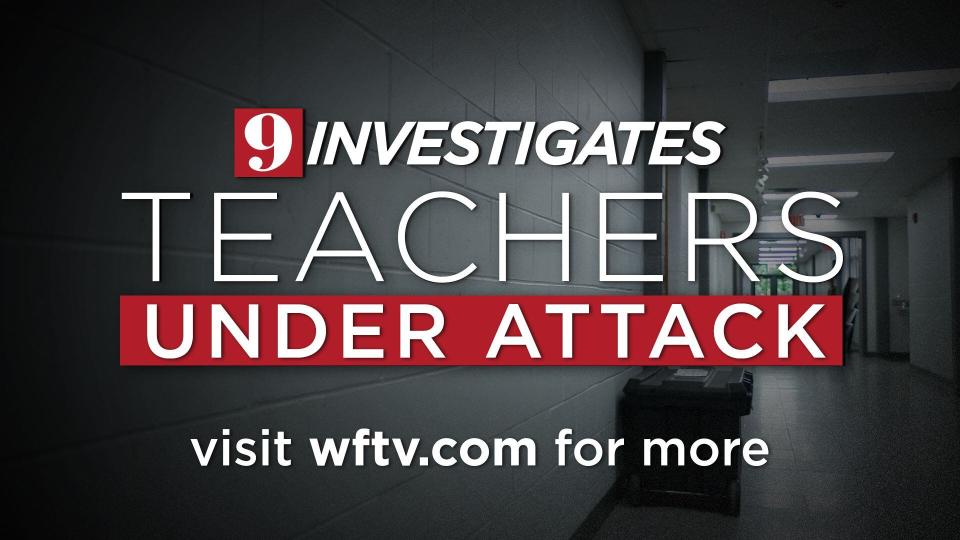

“I think it’s certainly a crisis in our country… the number of teachers who are experiencing these kinds of issues,” McMahon said. “If people are finding it’s not a good place to work, then certainly it’s not a good place for students either.”
Lara Watkins, a middle school teacher in Brevard County, Florida, told WFTV she considered leaving the profession after a violent encounter with a student when a door grazed his sneakers.
“He shoved me. I put my hands out in front of me to keep the distance. He kicked my hand, pushed my hands away from me and grabbed my wrist, chest bumped me,” Watkins said, noting that a former student intervened and pulled the boy away, as he was trying to punch her.
“Because his sneakers were worth more than my whole being,” Watkins quipped. “Students just — they do what they want. They are backed up by their parents.”
-
Two-thirds of the teachers surveyed blamed lack of parent involvement or discipline as the largest factor in student behavior – far outweighing things like cell phones at school, social media influences, or more students being below grade level.
-
Nearly half of the teachers surveyed said they would welcome de-escalation training.
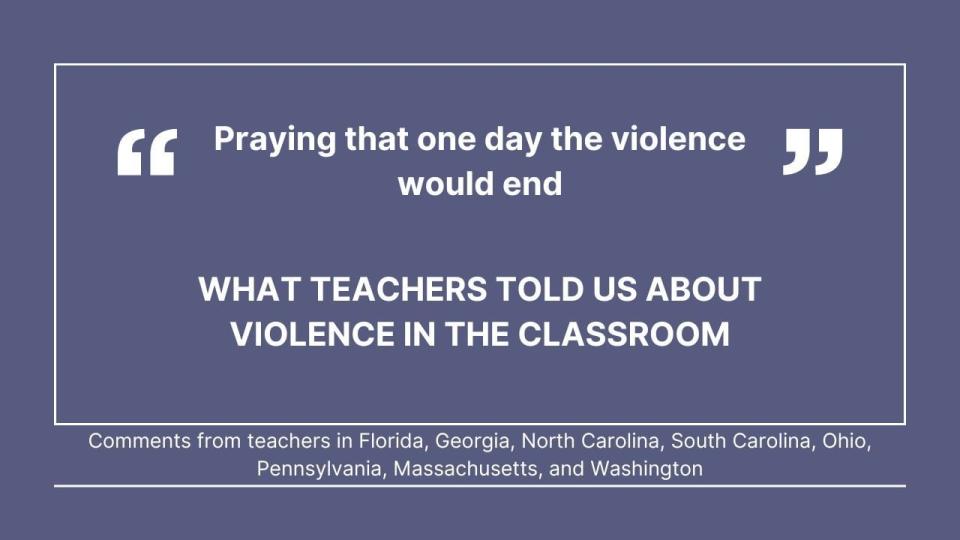

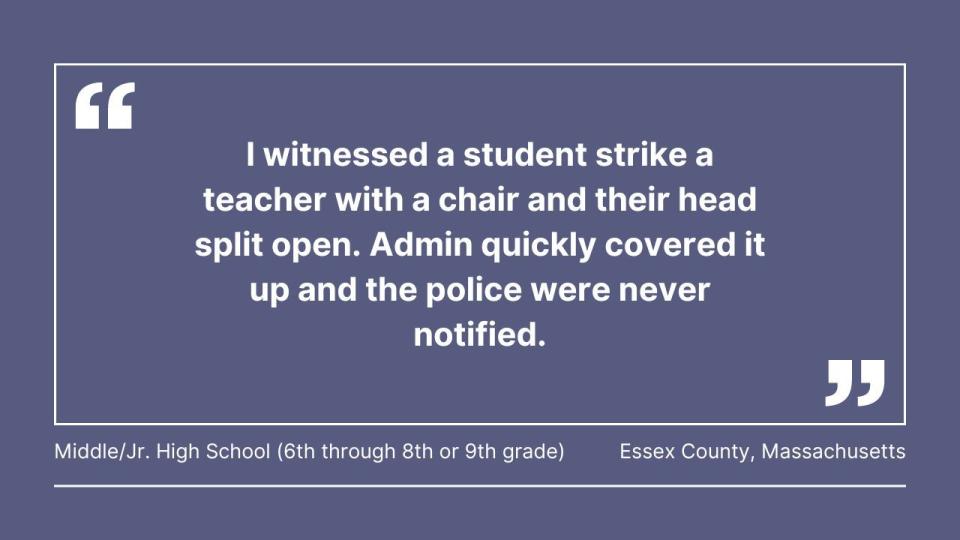

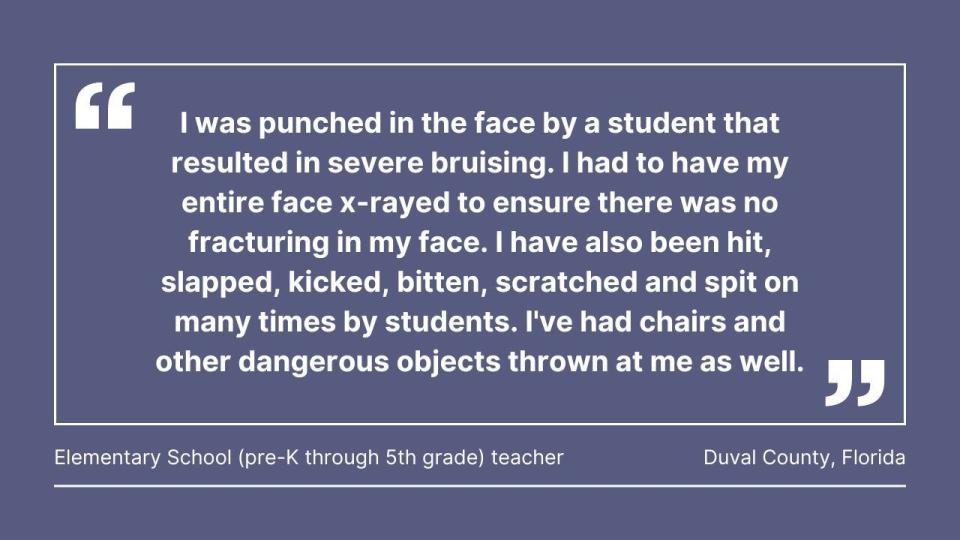

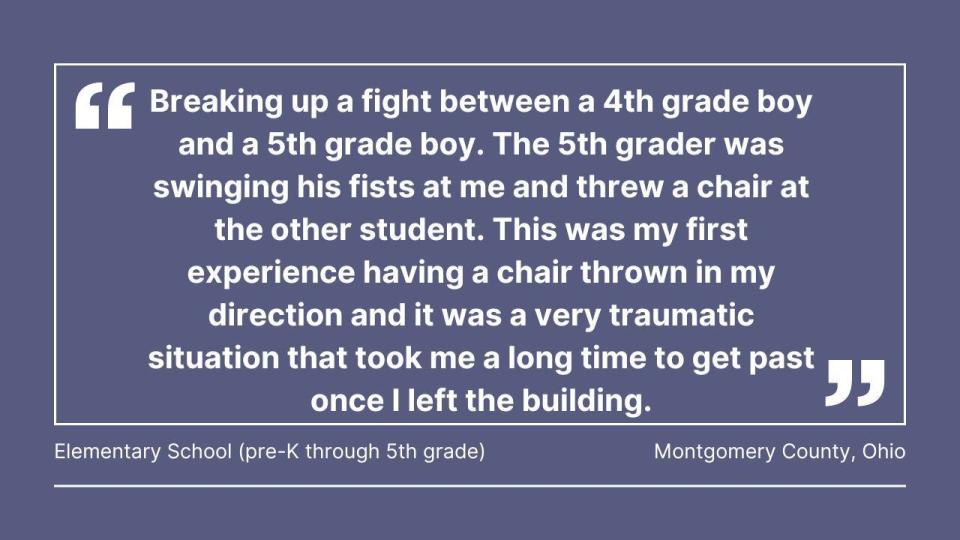

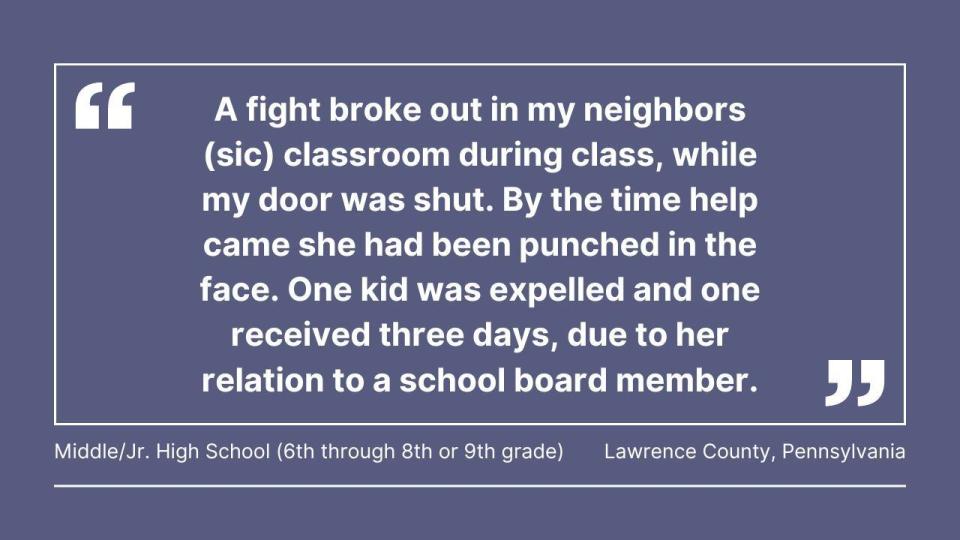

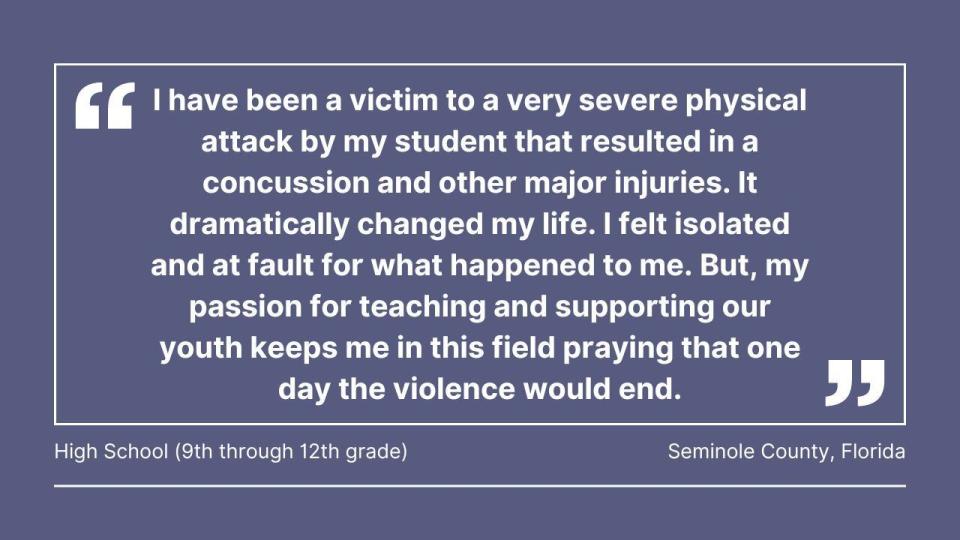

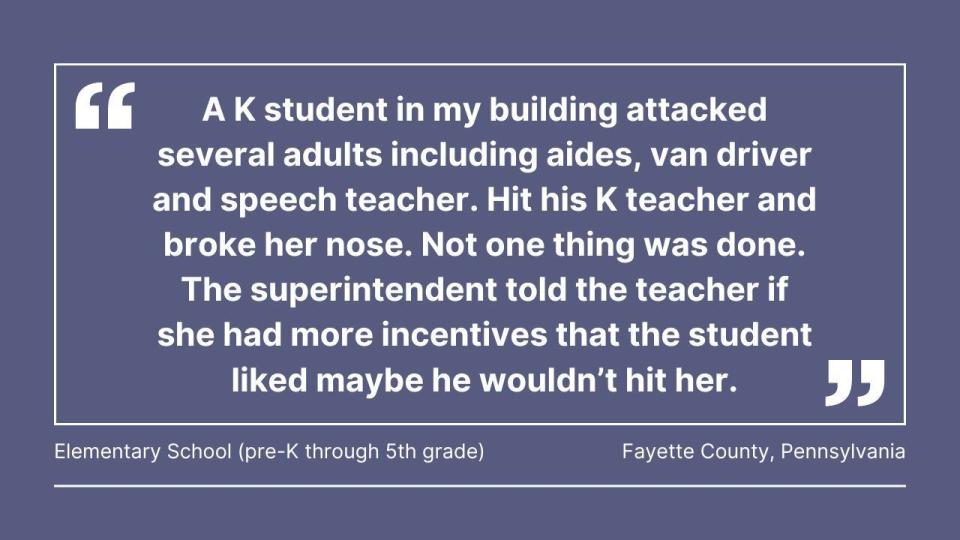

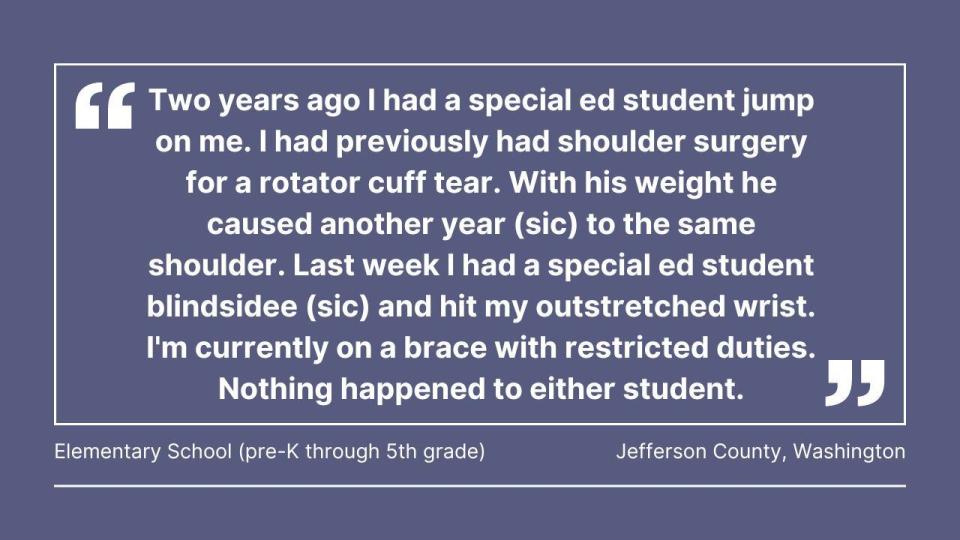

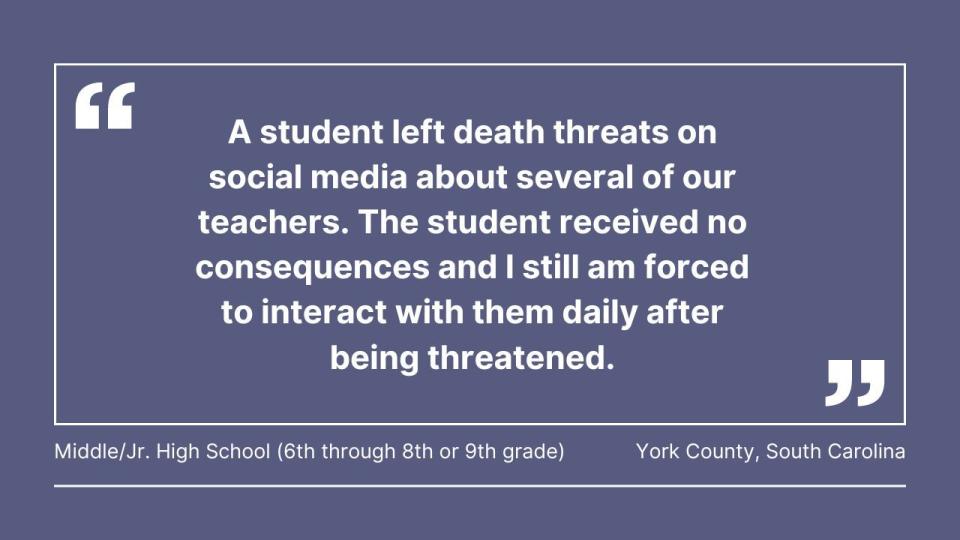

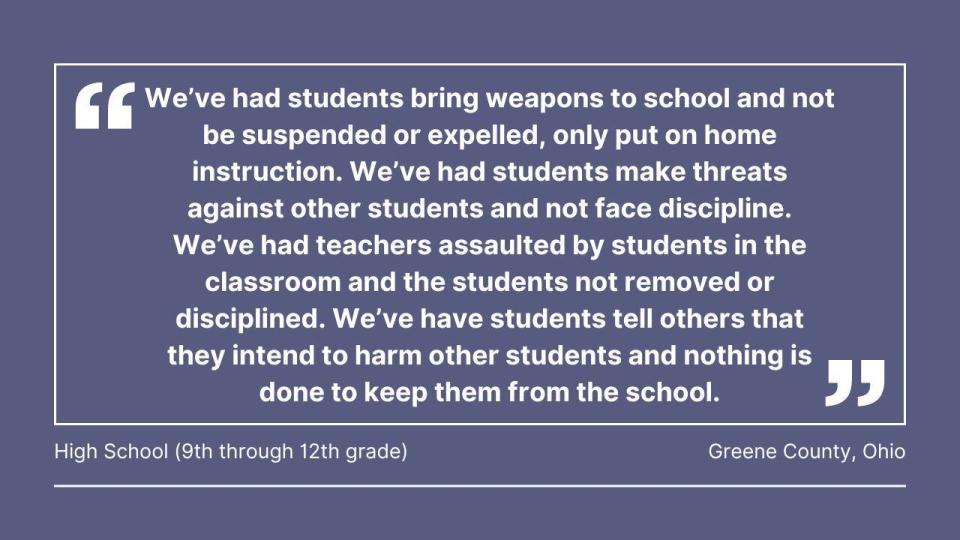

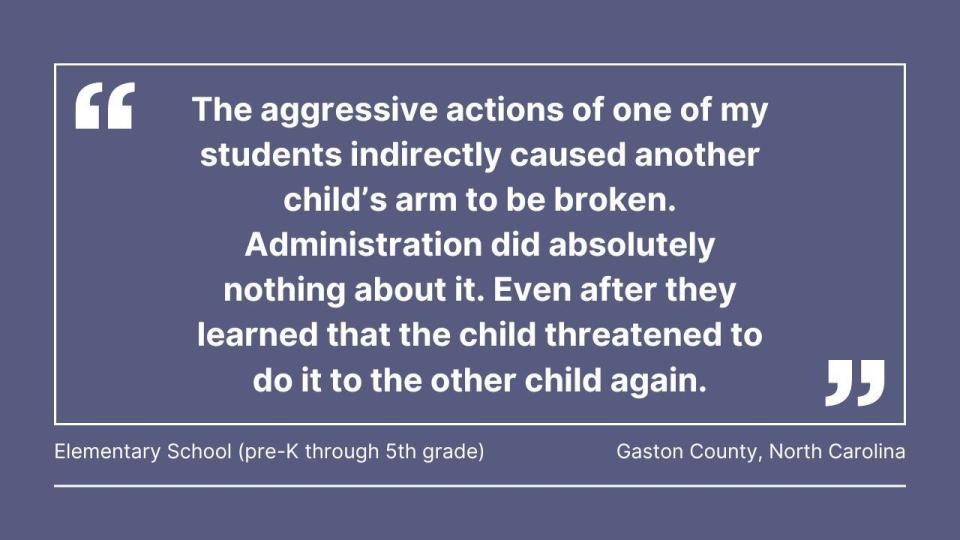

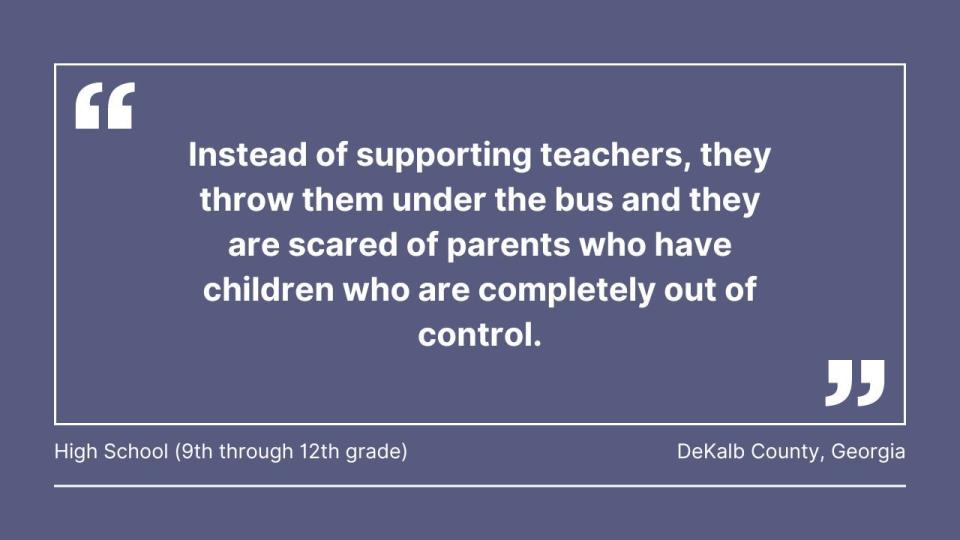

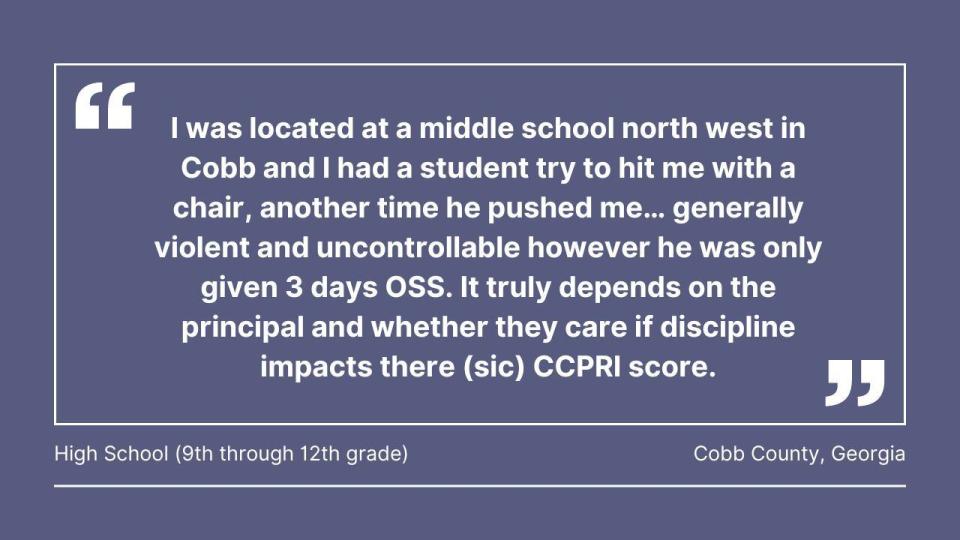

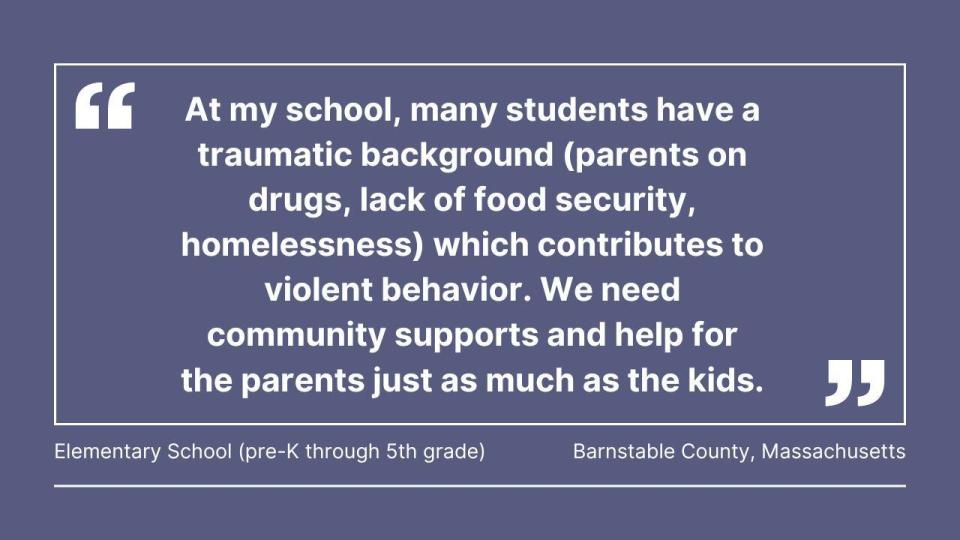

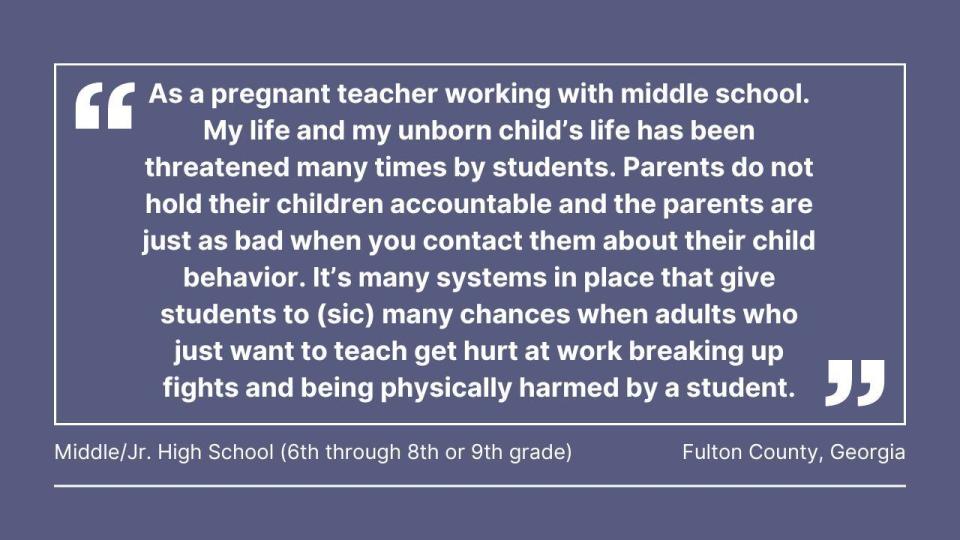

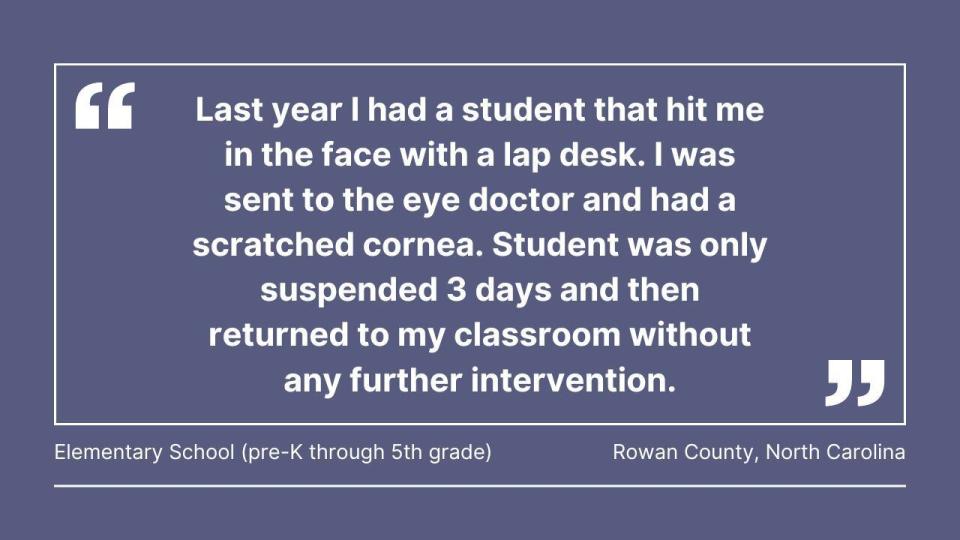

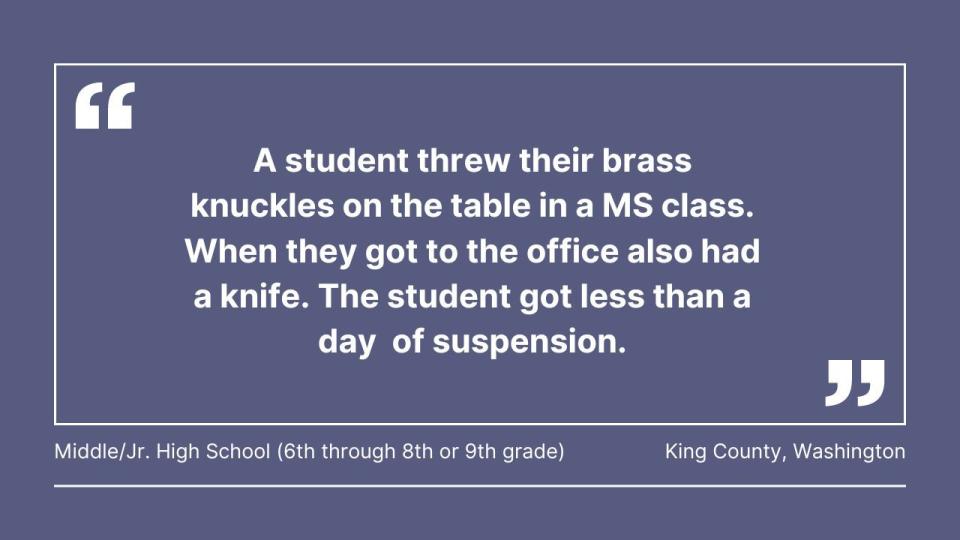

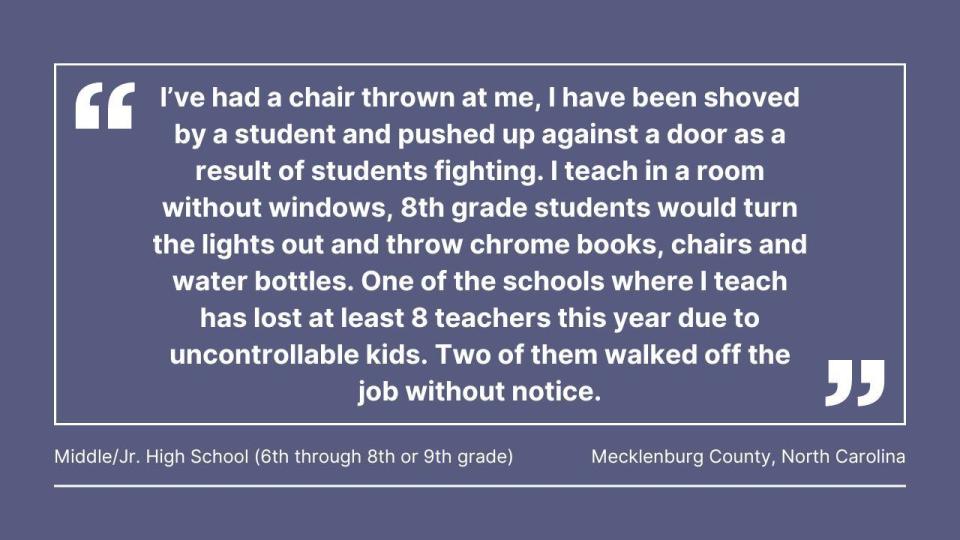

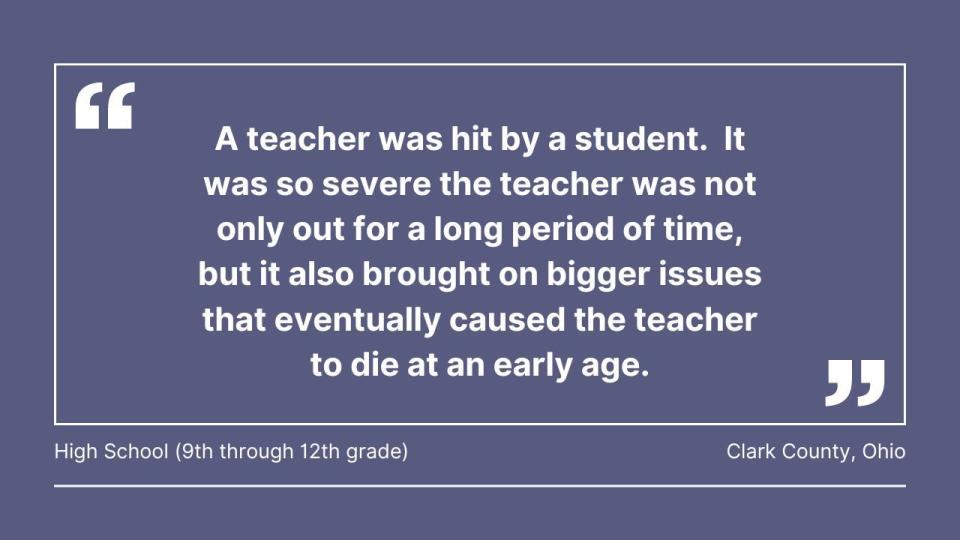

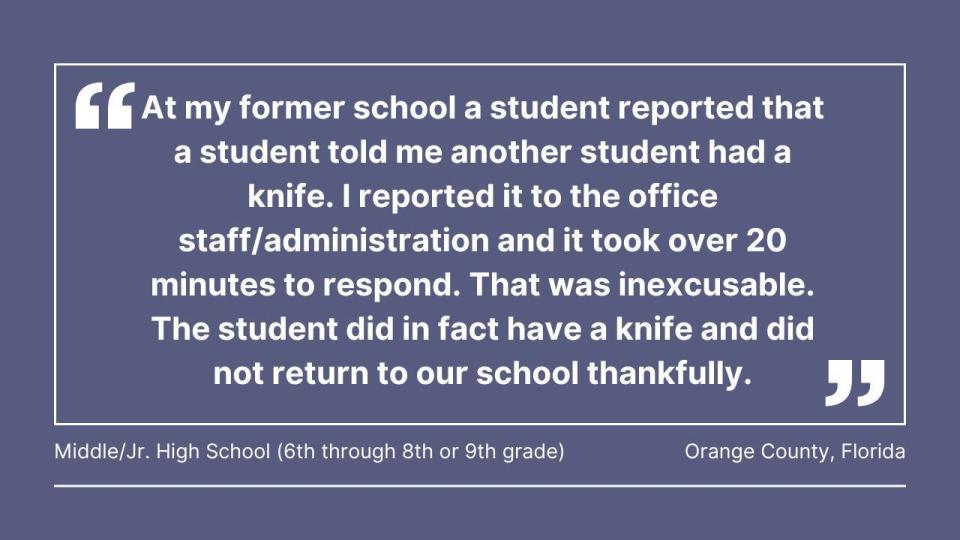

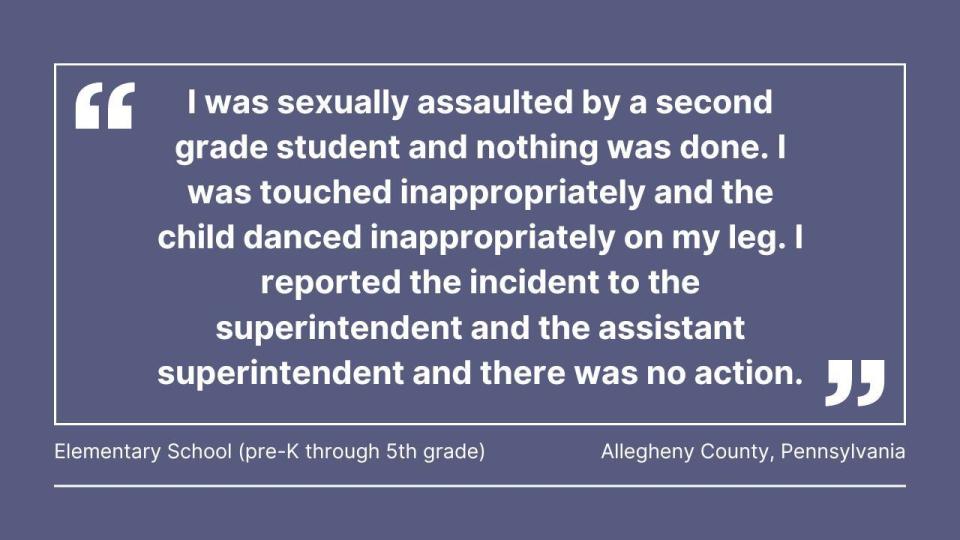

Most of the teachers who participated in the survey said they teach elementary school, and most described their school as suburban. Seventy percent said they have more than 10 years of teaching experience.
“These days, kids come with a whole lot of different experiences coming into the school setting – and they’re not necessarily positive. And it’s not always socio-economic either,” said Amy Roberts, who recently left the profession after 38 years teaching in Duval County, Florida.
Roberts specialized in teaching students with emotional behavioral disorders. “The behaviors can escalate very easily,” said Roberts. “Anything from just throwing items or flipping a desk, or, you know, being you know, being angry.”
Florida Education Association President Andrew Sparr said experienced teachers are leaving at rates he’s never seen before. After pay, he says student behavior is the top reason why.
“I’ve seen it. I’ve witnessed it firsthand as a teacher myself. But what we’re hearing from teachers right now, is that it’s just out of control,” Sparr said, adding that teachers need more mental health resources, more support for special needs students, and a more consistent approach to discipline. “When we were fully funded, we had more manpower,” Roberts told WJAX-TV. “It was really important because if children just needed more hands-on contact from the teacher, and an assistant or someone in the classroom. And when those needs are addressed, that tends to curb the behaviors.”
“I have a daughter who wanted to be a teacher. And the more that she has seen what teachers go through, she stepped away, and decided to do something different,” said Amber Strickland, who taught elementary school in Harrelson County, Georgia for more than 20 years.
She said she was attacked with a reusable water bottle – by a fourth grader.
“He just started hitting me with it everywhere from the shoulder down to the knee, because he was just mad at me, because I did not give him his water bottle like he wanted,” Strickland said. “For the rest of the school year, he was in my classroom every day.”
-
58% of the teachers surveyed said, at their school, students who commit violence against teachers are generally not held accountable.
“I’ve been kicked, I’ve been pinched, students have tried to bite me… a student threatened to throw a chair at me,” said a North Carolina teacher, in an interview with WSOC-TV. She asked that her name not be disclosed.
She said she retired last year after more than 20 years in the classroom. It was earlier than she planned, but she said a series of incidents involving a second grader pushed her over the edge.
“This particular second-grade student had made threats to shoot all the teachers and shoot all the students,” she said. “Three weeks later, I encountered that student with a gun in his front pocket of his sweatshirt. I immediately removed the student from the classroom and restrained him in the hallway while he was fighting to get away from me.”
She said it turned out to be a realistic-looking toy gun. But she didn’t feel like her school administrators took the threat seriously and the student was placed back in her classroom.
“The student was in second grade, and they can’t suspend a second-grade student,” she said.
More than 1,100 teachers who took the survey wrote in with personal comments or stories; many asked to remain anonymous because their school or district prohibits them from talking with members of the media. Because of that, parents and other members of the community often find out about violent incidents only after students relay what happened, when cell phone videos are posted online, or when incidents attract law enforcement attention. However, the teachers who responded to the survey described more regular occurrences of violence with weapons like students’ pencils, chairs, or fists.
-
One Pennsylvania teacher wrote: “We had a teacher that was violently attacked. Her jaw was broken, and she has required numerous surgeries.”
-
A fourth-grade teacher wrote: “After tapping a child on the shoulder and asking them to stop talking I was punched in the back as I walked away.”
-
“I had to teach my next class with a swollen and split lip. Throughout my lesson I was spitting blood in the garbage can,” wrote a high school teacher who tried to stop a fight between students.
“I think there’s certainly valuable information that every school district can reflect on,” said Grant Rivera, Superintendent of Schools in Marietta, Georgia.
Rivera reviewed the survey data and said he was particularly struck by the number of teachers who said they’d considered leaving the profession.
“As school systems across the country, we have to analyze what the root cause of those feelings are and make sure that we’re as proactively as possible trying to address those,” Rivera said. “We can’t wait until after the fact, because at that point, that person has left the profession and left the classroom.”
Rivera said his district has initiated quarterly listening sessions with staff members.
“Every day is a struggle. I am contemplating every day. Should I retire now?” said a DeKalb County, Georgia high school teacher with three decades of teaching experience.
She asked not to be identified – but, in an interview with WSB-TV, described being hit in the face with a metal object by a student last year. She said she’d been standing in the hall talking with a coworker and hadn’t even addressed the student.
“To be honest, I’m scared every day out of my mind,” she said. “There are kids who would like to come up and hug you, who are kind. You just never know who’s coming to attack you – and so, you don’t feel safe,” she said.
In 2022, Fabyonne Williams resigned after 25 years as a Pittsburgh Public Schools teacher. She called the job her lifelong dream, until it wasn’t.
“A teacher should never have to secure themselves from an angry parent. Our secretary at one of our schools has a baseball bat under her desk, because she’s the first line,” Williams said.
Williams told WPXI-TV her job changed in the last several years as students’ behavioral issues worsened and some parents became less interested in the educational success of their students. She said in many schools, violence is out of control, and chaos in the classroom makes learning challenging for students. Williams said her husband, a retired Pittsburgh police officer, worried about her safety, adding “He always said I did more policing than he did.”
“I think this is something that across the nation we’ve seen school violence as an epidemic,” said Aaron Chapin, president of the Pennsylvania State Education Association. “Since COVID, I think they’ve been pushed to the limits. They’ve been stretched thin. We have shortages.”
Chapin said the tens of thousands of teachers that belong to his union are concerned about school violence in all its forms. The union launched a school violence task force within the past year.
“We need to address it as quickly as possible. There is no time to spare,” Chapin said.
Ohio Education Association President Scott DiMauro told WHIO-TV “no physical altercations are acceptable,” and that the problem requires “comprehensive and collaborative” solutions.
“This is an issue that remains a challenge,” DiMauro said. “And as we’re working to recruit and retain caring, qualified educators in all our classrooms, we have to make sure that we have safe environments, because otherwise we’re going to lose good people.”
DiMauro said his union opted not to distribute the survey to its teachers because it has a policy prohibiting that.
“We do have protocols where if we’re going to do a member survey that we’re directly involved in the creation of that survey and we’re directly involved in and kind of how the data gets used,” DiMauro said.
State teachers’ unions in Florida, Massachusetts and Georgia distributed the survey to all of their members, and several local chapters in Pennsylvania also sent the survey directly to teachers. In Ohio, Washington, North Carolina and South Carolina, the reporters also sent the survey link directly to teachers’ publicly posted email addresses. The team also utilized social media to send the link directly to K-12 teachers.
Dr. McMahon wasn’t surprised that some unions declined to ask their teachers to participate. They traditionally have to balance the interests of their members while maintaining working relationships with education leaders, who are often concerned about the image of their students and their parents.
“If you get that data out there, there could be a fear that it makes it look like things are worse than they want them to appear,” McMahon said. “It may uncover some things and it might have some implications for people’s jobs and, sort of, put them under more scrutiny.”
McMahon commended the project, saying she had not seen investigative reporting of this magnitude on this issue previously.
“I was impressed. I thought it was really good. I think often, there’s just not been very many efforts like that – especially with the size [sample] that you have,” McMahon said. “If we don’t have any idea of the extent of the problem… I think it’s harder to come up with effective solutions.”
She said teachers’ mental health, stress, and anxiety levels are also of great concern and need to be addressed.
“Mentally, I wasn’t prepared to even look at a school,” said Tuwana Turner, following her violent attack caught on cell phone video in 2023.
The Georgia English teacher suffered a serious leg injury that required surgery and months of rehabilitation.
“It was a traumatizing experience,” said Turner. “I couldn’t do anything. Somebody had to feed me. I had to have home health care.”
She said even as the physical injuries started to heal, she couldn’t go back to the job she loved. Despite their violent encounters, many of the teachers who responded to the survey still conveyed their love for teaching and for most of their students.
Boston-area teacher Cliff Canavan said he’s concerned about the quality of the education those students are receiving.
“What is protecting the other 29 kids in a classroom of 30, when you get that one kid that is violent or foulmouthed?” said Canavan. “The current laws don’t allow us to hold them accountable effectively.”
He believes that coupled with discipline, many students also need help.
“There are a lot of traumatized kids that are coming in, and their behavior is a reflection of their experiences at home,” said Canavan. “So, putting things in place that allow us to help them and support them so that they can correct their behavior is a fantastic idea.”
But Canavan said that would require additional funding many school districts don’t have. He said teachers at his school have now been told to stop intervening in student fights and to instead focus on “crowd control.”
After her attack, Seattle-area teacher Stephanie Hartung found out the sixth grader who’d joined her class had twice been arrested for attacking other adults in the prior weeks. Prosecutors told KIRO-TV the child was only 11 years old at the time of those incidents and could not be legally prosecuted. The school put her on a “safety plan” that included adult supervision in the hallway between classes.
“She couldn’t be in the hallway by herself, but she could be in my classroom with me and 20 other students, like, that doesn’t make sense,” said Hartung. “I didn’t know her past… beyond, what had happened just at our school. What kind of reentry steps should have been taken before she was allowed to be in anyone’s classroom?”
According to prosecutors, the child had just turned 12 when she attacked Hartung, so they were able to charge her with felony assault. The court released her on electronic home monitoring and prosecutors say she committed several additional crimes before she was sentenced to juvenile custody in December. She has already been released.
Hartung says her school has a new principal and vice principals this year and she feels more supported. She works closely with a coaching team and the school has behavior interventionalists who have helped to decrease the number of violent incidents. She said despite the attack, she couldn’t imagine teaching at a better school.
“I love my job and I love my school so much. I don’t want to do anything else,” said Hartung. “And I didn’t want her to take that from me.”
Contributing Reporters:
-
Justin Gray and Amanda Stanley, WSB-TV, Atlanta
-
Kerry Kavanaugh, WFXT-TV, Boston
-
Deedee Sun and Julie Berg, KIRO-TV, Seattle
-
Ashlyn Webb, WFTV-TV, Orlando
-
Jonathan Lowe and Michael Praats, WSOC-TV, Charlotte
-
Jatara McGee and Alex Popichak, WPXI-TV, Pittsburgh
-
Emily Turner, WJAX-TV, Jacksonville
-
John Bedell, WHIO-TV, Dayton
-
Samantha Manning, CMG Washington National Bureau
-
Josh Wade, Cox Media Group
-
Natalie Dreier, Cox Media Group National Content Desk (web presentation)
